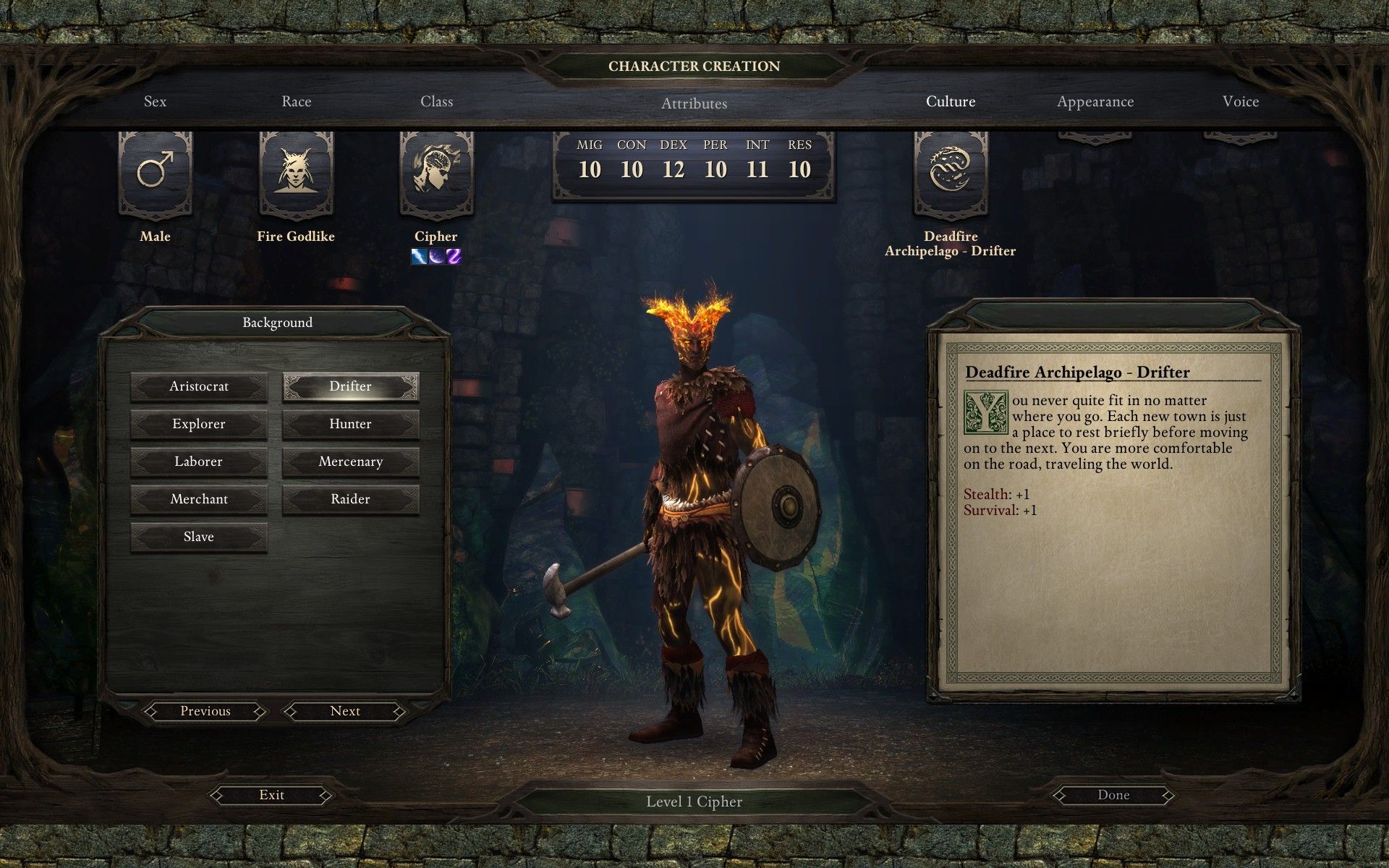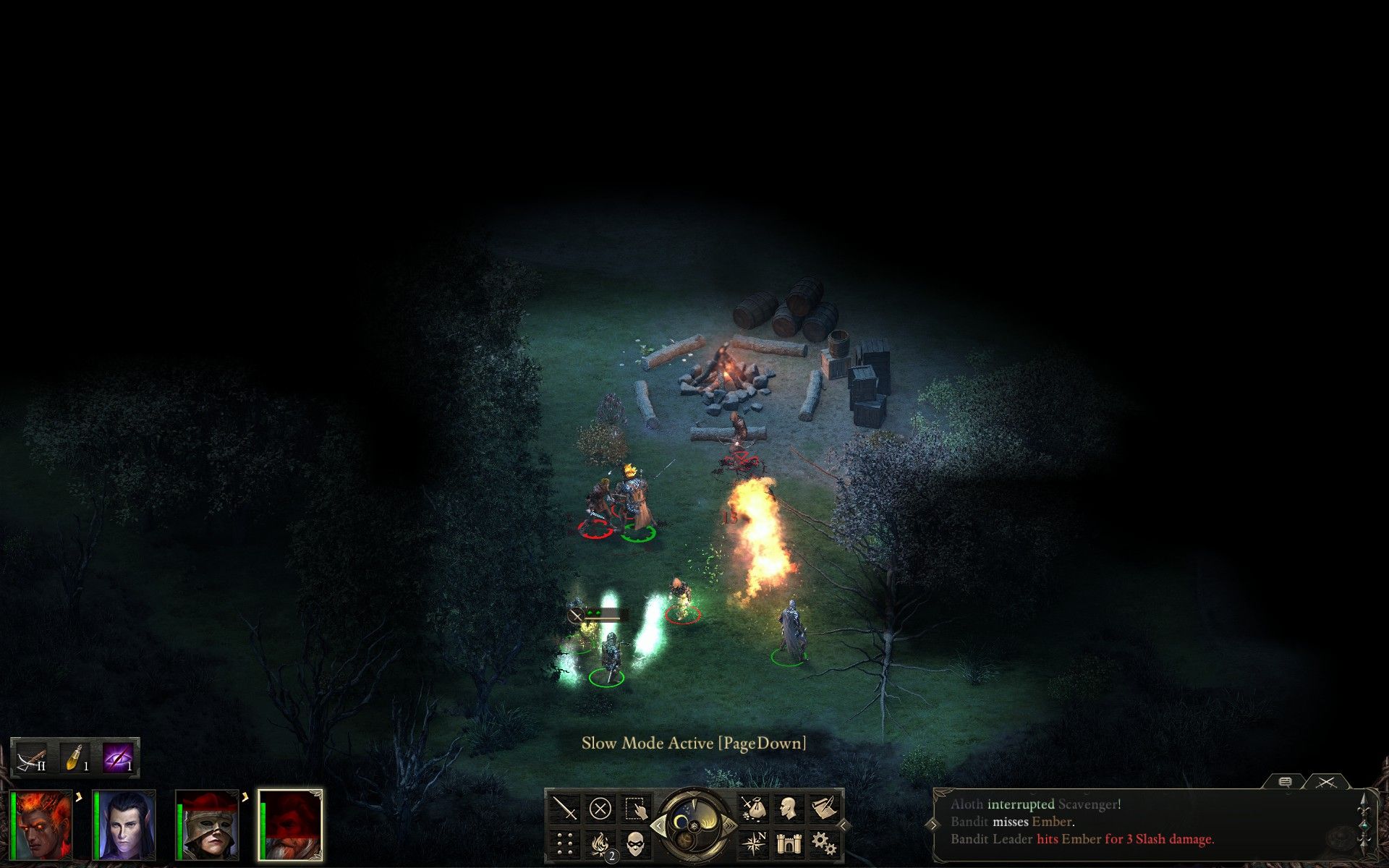Simply put, Pillars of Eternity can become maddening if players aren't careful. Unlike most modern RPGs, this isometric game requires a large investment of time and strategy not only to progress, but also to have a good time doing so. Granted, the game design attempts to steer players in the right direction, but it won't hold their hand and offer the ability to back out of every possible bad decision.
No one wants to play a game for ten to twenty hours only to discover that it's in his or her best interest to restart the adventure. That's the kind of mishap that can turn players off a game for good! After investing numerous hours in the game, I found the following tips, or pillars, to be helpful for getting the most out of Pillars of Eternity and avoiding a potential rage-quit. (For tips on how to build your starting class, head over to Jonathan Leack's guide.)
1. Choose the Right Difficulty
This may seem obvious, but choosing the right difficulty for your skills will ensure that you want to forge onward. Don't let your ego get in the way of this personal choice. No one is looking over your shoulder, so don't hesitate to choose “easy” if you're unfamiliar with Infinity Engine RPGs. Believe me when I say that “normal” difficulty is still challenging. Fortunately, players can change the difficulty setting between “easy,” “normal,” and “hard” at any time.
However, the hardest difficulty setting, “Path of the Damned,” when selected at the start of the game, cannot be changed. Additional options include two modifiers that can be applied to any difficulty mode but cannot be changed in-game. Expert mode disables several “help” features so players will need to figure out the game on their own, while Trial of Iron mode gives players only one save file that is deleted if they dies, forcing them to start over.

2. Don't Rush Character Creation
Simply creating a character can be overwhelming at first, and it's entirely possible to create a gimped character by making bad choices. No stat is useless for any of the four classes, but some are much better than others. For example, the Rogue prefers might and dexterity, but intellect is also helpful to increase ability duration (like poisons). However, you don't want to invest too heavily in intellect or else your attacks will be weak.
Many other choices, such as subrace and culture, offer stat boosts or ability enhancers, so it pays to take your time and consider all options before finishing your character. It's also a good idea to take your playing style into consideration because it would suck to be forced to play for hours and hours in a manner that you don't enjoy. There are a plethora of choices available to create the ideal hero, so don't rush through it!

3. Party Up Before You Party On
Traveling through the world of Eora quickly becomes impossible by yourself, so it pays to find a few companions ASAP. There are eight companions in the game who are completely fleshed out, from class and culture to appearance and personality. However, since the game is so large, players won't find them very quickly, so I suggest going to the local tavern and hiring companions early on.
This had the distinct advantage of letting players create them from scratch, just like creating the original hero. Pre-made companions don't offer much flexibility in combat, but add a couple of custom companions and the options really open up!
Say you start with a melee-based character and then find your first companion, who's also a melee fighter. Simply add a magic user or two, such as the Wizard, Priest, or Chanter, and your party starts to become well-rounded. It's crucial to have plenty of options when fighting enemies because charging in and attempting to pound them to death is not effective.

4. Strategy Trumps Brute Force
Blindly rushing in and attacking will work in the first few areas, but soon this tactic is destined to failure. The reason is twofold. First of all, there is no A.I. for companions, so they won't use any special abilities on their own. Second, encounters usually toss multiple enemies of different types at players, so prioritizing which enemies to disable as well as which one to attack first and what attacks to use are very important. That's why I suggest referring to the bestiary to discover the strengths and weaknesses of each enemy type.
Additional strategies include utilizing the landscape of each area to your advantage. Why fight multiple enemies in an enclosed space when you can lure them into a large, open area? Funneling enemies into a small path, like a doorway, and blocking it with a Fighter or Barbarian is also a great way to limit the number of them who can attack at once. Don't forget the tried-and-true strategy of keeping ranged companions at a distance while sending in melee fighters to gain aggro and take the brunt of the damage.

5. Focus on Questing
Farming mobs is not a useful strategy in Pillars of Eternity because players don't earn XP for defeating enemies. That's right. No experience is earned for killing anything! The only advantages gained from combat are clearing the area, earning money, and finding random loot. Part of the reason for this design decision is to let players who invest in the Stealth stat avoid combat by sneaking by their enemies.
Completing quests is the most effective way to level up your character and your companions. Following the main quest line will only earn a moderate amount of XP, which is why it's necessary to undertake optional side quests. I suggest taking every side quest you find that doesn't negatively impact any reputations you're trying to build. That way, you can upgrade your characters and earn new abilities faster.

6. Customize Stronghold
Thanks to a wildly successful Kickstarter campaign, this game offers much more than mere player housing. The Stronghold is a large acreage of land where the player's castle and many peasants reside. While the Stronghold is rather dilapidated at first, players can upgrade it in numerous ways to give them helpful advantages: collecting taxes, gaining resting bonuses, generating crafting ingredients, and even sending idle companions off on their own adventures.
It's also possible to recruit Hirelings and have them protect the Stronghold from bandits who want nothing more than to steal money. Some Hirelings are much more useful than others because they offer bonuses to prestige. Others are not so useful, and some will leave the Stronghold if they aren't paid, so balancing the usefulness of Hirelings against their pay is necessary.







